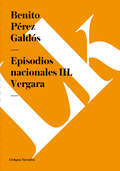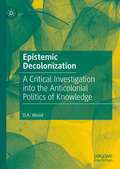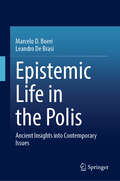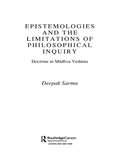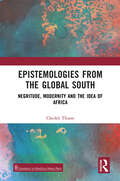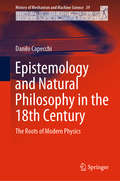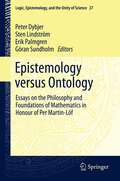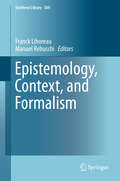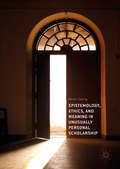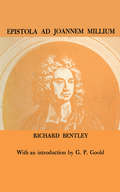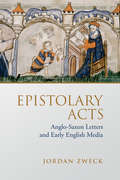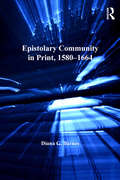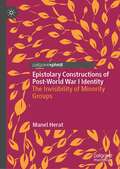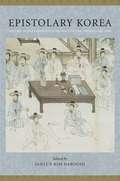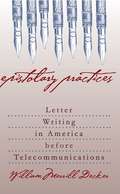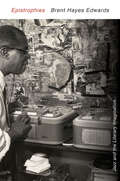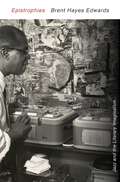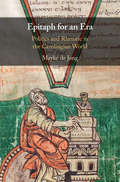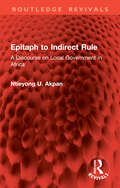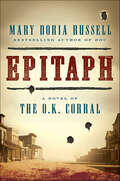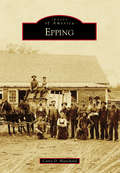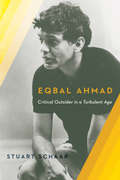- Table View
- List View
Episodios nacionales III. Vergara
by Benito Pérez GaldósVergara is the seventh novel in the third series of Episodios Nacionales by Benito Pérez Galdós. Don Fernando is sent to negotiate a peace between warring factions during the Carlist war. Through deception and trickery he makes his way through enemy territory. In this time, the author demonstrates the effects of the Carlist war on the people and culture of the era.
Epistemic Decolonization: A Critical Investigation into the Anticolonial Politics of Knowledge
by D.A. WoodEuropean colonization played a major role in the acquisition, formation, and destruction of different ways of knowing. Recently, many scholars and activists have come to ask: Are there ways in which knowledge might be decolonized? Epistemic Decolonization examines a variety of such projects from a critical and philosophical perspective. The book introduces the unfamiliar reader to the wide variety of approaches to the topic at hand, providing concrete examples along the way. It argues that the predominant contemporary approach to epistemic decolonization leads one into various intractable theoretical and practical problems. The book then closely investigates the political and scientific work of Frantz Fanon and Amílcar Cabral, demonstrating how their philosophical commitments can help lead one out of the practical and theoretical issues faced by the current, predominant orientation, and concludes by forging links between their work and that of some contemporary feminist epistemologists.
Epistemic Life in the Polis: Ancient Insights into Contemporary Issues
by Marcelo D. Boeri Leandro De BrasiThis book shows the interesting connections within political epistemology that can be established between ancient approaches and contemporary ones. It stems from the conviction that ancient thought can be brought into discussion with contemporary views. Although the book is not intended as an exegetical work, the authors offer detailed interpretations of ancient philosophers while taking into consideration recent specialized discussions in the scholarship with a focus mainly on the systematic aspects of those philosophers rather than on the historical ones. By exploiting insights of Ancient Greek philosophers, and providing an examination of certain intellectual attitudes and virtues that have both an ethical-political and epistemic dimension, the reader will better understand contemporary issues within political epistemology.
Epistemologies and the Limitations of Philosophical Inquiry: Doctrine in Madhva Vedanta (Routledge Hindu Studies Series)
by Deepak SarmaDeepak Sarma explores the degree to which outsiders can understand and interpret the doctrine of the Màdhva school of Vedànta. The school is based on insider epistemology which is so restrictive that few can learn its intricate doctrines. This book reveals the complexity of studying traditions based on insider epistemologies and encourages its audience to ponder both the value and the hazards of granting any outsider the authority and opportunity to derive important insights into a tradition as an insider.
Epistemologies from the Global South: Negritude, Modernity and the Idea of Africa
by Cheikh ThiamThis book argues that the pervasiveness of the modern paradigm and its corollary, the colonial matrix of power, have led scholars of Negritude to think of Leopold Sedar Senghor’s work either as an anti-thesis to the anti-Blackness constitutive of European modernity or as another manifestation of the West as subject of history. As opposed to this tradition, the book reads Negritude through the prism of endogenous African world views without the filter of the modern Western paradigm.Print edition not for sale in Sub Saharan Africa.
Epistemology and Natural Philosophy in the 18th Century: The Roots of Modern Physics (History of Mechanism and Machine Science #39)
by Danilo CapecchiThis book documents the process of transformation from natural philosophy, which was considered the most important of the sciences until the early modern era, into modern disciplines such as mathematics, physics, natural history, chemistry, medicine and engineering. It focuses on the 18th century, which has often been considered uninteresting for the history of science, representing the transition from the age of genius and the birth of modern science (the 17th century) to the age of prodigious development in the 19th century. Yet the 18th century, the century of Enlightenment, as will be demonstrated here, was in fact characterized by substantial ferment and novelty. To make the text more accessible, little emphasis has been placed on the precise genesis of the various concepts and methods developed in scientific enterprises, except when doing so was necessary to make them clear. For the sake of simplicity, in several situations reference is made to the authors who are famous today, such as Newton, the Bernoullis, Euler, d’Alembert, Lagrange, Lambert, Volta et al. – not necessarily because they were the most creative and original minds, but mainly because their writings represent a synthesis of contemporary and past studies. The above names should, therefore, be considered more labels of a period than references to real historical characters.
Epistemology versus Ontology
by B. G. Sundholm Erik Palmgren P. Dybjer Sten LindströmThis book brings together philosophers, mathematicians and logicians to penetrate important problems in the philosophy and foundations of mathematics. In philosophy, one has been concerned with the opposition between constructivism and classical mathematics and the different ontological and epistemological views that are reflected in this opposition. The dominant foundational framework for current mathematics is classical logic and set theory with the axiom of choice (ZFC). This framework is, however, laden with philosophical difficulties. One important alternative foundational programme that is actively pursued today is predicativistic constructivism based on Martin-Löf type theory. Associated philosophical foundations are meaning theories in the tradition of Wittgenstein, Dummett, Prawitz and Martin-Löf. What is the relation between proof-theoretical semantics in the tradition of Gentzen, Prawitz, and Martin-Löf and Wittgensteinian or other accounts of meaning-as-use? What can proof-theoretical analyses tell us about the scope and limits of constructive and predicative mathematics?
Epistemology, Context, and Formalism
by Franck Lihoreau Manuel RebuschiThe main purpose of the present volume is to advance our understanding of the notions of knowledge and context, the connections between them and the ways in which they can be modeled, in particular formalized - a question of prime importance and utmost relevance to such diverse disciplines as philosophy, linguistics, computer science and artificial intelligence and cognitive science. Bringing together essays written by world-leading experts and emerging researchers in epistemology, logic, philosophy of language, linguistics and theoretical computer science, the book examines the formal modeling of knowledge and the knowledge-context link at one or more of three intersections - context and epistemology, epistemology and formalism, formalism and context - and presents a novel range of approaches to the current discussions that the connections between knowledge, language, action, reasoning and context continually enlivens. It develops powerful ideas that will push the relevant fields forward and give a sense of the new directions in which mainstream and formal research on knowledge and context is heading.
Epistemology, Context, and Formalism (Synthese Library #369)
by Franck Lihoreau Manuel RebuschiThe main purpose of the present volume is to advance our understanding of the notions of knowledge and context, the connections between them and the ways in which they can be modeled, in particular formalized – a question of prime importance and utmost relevance to such diverse disciplines as philosophy, linguistics, computer science and artificial intelligence and cognitive science.Bringing together essays written by world-leading experts and emerging researchers in epistemology, logic, philosophy of language, linguistics and theoretical computer science, the book examines the formal modeling of knowledge and the knowledge-context link at one or more of three intersections - context and epistemology, epistemology and formalism, formalism and context – and presents a novel range of approaches to the current discussions that the connections between knowledge, language, action, reasoning and context continually enlivens. It develops powerful ideas that will push the relevant fields forward and give a sense of the new directions in which mainstream and formal research on knowledge and context is heading.
Epistemology, Ethics, and Meaning in Unusually Personal Scholarship
by Amber EspingThis book uses Viktor Frankl’s Existential Psychology (logotherapy) to explore the ways some professors use unusually personal scholarship to discover meaning in personal adversity. A psychiatrist imprisoned for three years in Nazi concentration camps, Frankl believed the search for meaning is a powerful motivator, and that its discovery can be profoundly therapeutic. Part I begins with four stories of professors finding meaning. Using the case studies as a foundation, Part II investigates issues of epistemology and ethics in unusually personal research from an existential perspective. The book offers advice for graduate students and faculty who want to live and work more meaningfully in the academy.
Epistola ad Joannem Millium
by G. P. Goold Richard BentleyThe year 1962 marks the tercentenary of the birth of Richard Bentley (1662-1742), Master of Trinity College, Cambridge, editor of Paradise Lost, but principally and justly famous as one of the greatest classical scholars. To mark the event, the University of Toronto Press is issuing a special reprint of Alexander Dyce's edition of the Epistola (1691), the work which first brought Bentley fame, and which has long been out of print.<P><P>This Latin exercise was called forth by one of those unhappy productions which, mediocre themselves, have had the ill luck to attract the inspection of genius. In the eighth or ninth century A.D., Joannes Malelas of Antioch, a Greek writer, attempted a chronological record of mankind and in it he had recourse to name or quote from classical works no longer extant. English scholars in the seventeenth century prepared a translation of the chronicle into Latin and an accompanying commentary; just before its publication, under the final editorship of John Mill, Bentley was given an opportunity to read proof-sheets and the result was the Epistola, a collection mainly of some twenty-five notes upon statements found in or topics suggested by Malelas. <P>This extraordinary performance by a scholar of 29 moves from one topic to another over a wide range of ancient literature, explaining or correcting some sixty Greek and Latin authors. The notes are not so much a commentary on the old chronicler as a set of dazzling dissertations pegged upon a random set of appalling howlers, and they reveal prodigious information and gift of divination. Bentley's style in Latin is clear and spirited and seasoned with choice of quotation. <P>The Epistola immediately secured for its writer the fame reserved for men of the rarest excellence and this classic among academic productions is still charged with power to instruct and inspire the scholarship of another era.
Epistolary Acts: Anglo-Saxon Letters and Early English Media (Toronto Anglo-Saxon Series)
by Jordan ZweckAs challenging as it is to imagine how an educated cleric or wealthy lay person in the early Middle Ages would have understood a letter (especially one from God), it is even harder to understand why letters would have so captured the imagination of people who might never have produced, sent, or received letters themselves. In Epistolary Acts, Jordan Zweck examines the presentation of letters in early medieval vernacular literature, including hagiography, prose romance, poetry, and sermons on letters from heaven, moving beyond traditional genre study to offer a radically new way of conceptualizing Anglo-Saxon epistolarity. Zweck argues that what makes early medieval English epistolarity unique is the performance of what she calls “epistolary acts,” the moments when authors represent or embed letters within vernacular texts. The book contributes to a growing interest in the intersections between medieval studies and media studies, blending traditional book history and manuscript studies with affect theory, media studies, and archive studies.
Epistolary Community in Print, 1580–1664 (Material Readings in Early Modern Culture)
by Diana G. BarnesEpistolary Community in Print contends that the printed letter is an inherently sociable genre ideally suited to the theorisation of community in early modern England. In manual, prose or poetic form, printed letter collections make private matters public, and in so doing reveal, first how tenuous is the divide between these two realms in the early modern period and, second, how each collection helps to constitute particular communities of readers. Consequently, as Epistolary Community details, epistolary visions of community were gendered. This book provides a genealogy of epistolary discourse beginning with an introductory discussion of Gabriel Harvey and Edmund Spenser’s Wise and Wittie Letters (1580), and opening into chapters on six printed letter collections generated at times of political change. Among the authors whose letters are examined are Angel Day, Michael Drayton, Jacques du Bosque and Margaret Cavendish. Epistolary Community identifies broad patterns that were taking shape, and constantly morphing, in English printed letters from 1580 to 1664, and then considers how the six examples of printed letters selected for discussion manipulate this generic tradition to articulate ideas of community under specific historical and political circumstances. This study makes a substantial contribution to the rapidly growing field of early modern letters, and demonstrates how the field impacts our understanding of political discourses in circulation between 1580 and 1664, early modern women’s writing, print culture and rhetoric.
Epistolary Constructions of Post-World War I Identity: The Invisibility of Minority Groups
by Manel HeratThis book analyses the letters of marginalised groups of World War I soldiers - including Black, Indian and disabled ex-servicemen - from a linguistic perspective, looking at issues such as descriptions of disability, identity and migration, dealing with minority groups who have long been rendered invisible, and exploring how these writers position themselves in relation to the 'other'. The author makes use of a corpus-assisted approach to examine identity construction and performance, shedding light on a previously under-explored demographic. This book will be of interest to students and scholars of World War I history, language and identity, psychological and physical disability, as well as readers seeking a fresh angle on a key period of 20th century history.
Epistolary Korea: Letters in the Communicative Space of the Choson, 1392-1910
by Jahyun Kim HaboushBy expanding the definition of "epistle" to include any writing that addresses the intended receiver directly, JaHyun Kim Haboush introduces readers to the rich epistolary practice of Choson Korea. The Choson dynasty (1392-1910) produced an abundance of epistles, writings that mirror the genres of neighboring countries (especially China) while retaining their own specific historical trajectory. Written in both literary Chinese and vernacular Korean, the writings collected here range from royal public edicts to private letters, a fascinating array that blurs the line between classical and everyday language and the divisions between men and women. Haboush's selections also recast the relationship between epistolography and the concept of public and private space. Haboush groups her epistles according to where they were written and read: public letters, letters to colleagues and friends, social letters, and family letters. Then she arranges them according to occasion: letters on leaving home, deathbed letters, letters of fiction, and letters to the dead. She examines the mechanics of epistles, their communicative space, and their cultural and political meaning. With its wholly unique collection of materials, Epistolary Korea produces more than a vivid chronicle of pre- and early modern Korean life. It breaks new ground in establishing the terms of a distinct, non-European form of epistolography.
Epistolary Korea: Letters in the Communicative Space of the Chosôn, 1392-1910
by Jahyun Kim HaboushBy expanding the definition of "epistle" to include any writing that addresses the intended receiver directly, JaHyun Kim Haboush introduces readers to the rich epistolary practice of Chos?n Korea. The Chos?n dynasty (1392-1910) produced an abundance of epistles, writings that mirror the genres of neighboring countries (especially China) while retaining their own specific historical trajectory. Written in both literary Chinese and vernacular Korean, the writings collected here range from royal public edicts to private letters, a fascinating array that blurs the line between classical and everyday language and the divisions between men and women. Haboush's selections also recast the relationship between epistolography and the concept of public and private space.Haboush groups her epistles according to where they were written and read: public letters, letters to colleagues and friends, social letters, and family letters. Then she arranges them according to occasion: letters on leaving home, deathbed letters, letters of fiction, and letters to the dead. She examines the mechanics of epistles, their communicative space, and their cultural and political meaning. With its wholly unique collection of materials, Epistolary Korea produces more than a vivid chronicle of pre- and early modern Korean life. It breaks new ground in establishing the terms of a distinct, non-European form of epistolography.
Epistolary Practices
by William Merrill DeckerLetters have long been read as primary sources for biography andhistory, but their performative, fictive, and textual dimensionshave only recently attracted serious notice. In this book, William Merrill Decker examines the place of the personal letter in American popular and literary culture from the colonial to thepostmodern period. After offering an overview of the genre, Decker explores epistolary practices that coincide with American experiences ofspace, settlement, separation, and reunion. He discusses letterswritten by such well-known and well-educated persons as JohnWinthrop, Benjamin Franklin, Thomas Jefferson, Abigail and JohnAdams, Nathaniel Hawthorne, Margaret Fuller, Henry David Thoreau, Samuel Clemens, Henry James, and Alice James, but also letters by persons who, except in their correspondence, were not writers at all: indentured servants, New England factory workers, slaves, soldiers, and Western pioneers. Individual chapters explore the letter writing of Ralph Waldo Emerson, Emily Dickinson, and Henry Adams--three of America's most ambitious, accomplished, and theoretically astute letter writers. Finally, Decker considers the ongoing transformation of letter writing in the electronic age.
Epistrophies: Jazz And The Literary Imagination
by Brent Hayes EdwardsHearing across media is the source of innovation in a uniquely African American sphere of art-making and performance, Brent Hayes Edwards writes. He explores this fertile interface through case studies in jazz literature—both writings informed by music and the surprisingly large body of writing by jazz musicians themselves.
Epistrophies: Jazz and the Literary Imagination
by Brent Hayes EdwardsHearing across media is the source of innovation in a uniquely African American sphere of art-making and performance, Brent Hayes Edwards writes. He explores this fertile interface through case studies in jazz literature—both writings informed by music and the surprisingly large body of writing by jazz musicians themselves.
Epitaph for Three Women (Plantagenet Saga #12)
by Jean Plaidy('The twelfth in the Plantagenet Saga) Henry V had died leaving a nine-month-old son as King of England. Before his death he had married Katherine of Valois, daughter of the French King, and according to the peace terms he had made with France, on the death of poor, mad Charles VI, he was to have been crowned King of France. Ambitious men surrounded the baby King, chief of whom were the child's uncles, the Dukes of Bedford and Gloucester.Bedford, shrewd, clever, born to be a leader, had idolized his brother, the late King, and sought to hold together all he had won and to keep it for young Henry VI. Gloucester, man of letters though he was, had poor judgment; greedy for wealth and power, he was frequently engaged in lost causes and throughout his life kept a feud with his uncle the powerful Cardinal Beaufort. There were three women living at this time who were to have a marked effect on the future. One of these was Katherine de Valois who, haunted by memories of an unhappy childhood overshadowed by a mad father and a rapacious and lascivious mother, discovered romantic happiness in an unexpected quarter and founded the Tudor dynasty. Then in complete contrast there was the peasant girl from Domremy. When Joan of Arc tending her father's flocks heard heavenly voices commanding her to lead France to victory, she thought she was dreaming. But eventually, convinced that she must obey her voices, she was caught up in one of the most amazing experiences ever recorded which took her from the pastures of her village to fiery martyrdom in the square of Rouen. Eleanor of Gloucester's affairs were less spectacular but she, too, wielded a certain power. First the Duke's mistress she plotted to become his Duchess and her influence was considerable until she became involved in a plot to murder and was the centre of a cause celebre. Against a background of Lancastrian England and war- torn France, with ambitious men juggling for power, with feuds between Beaufort and Gloucester and the Duke of Burgundy and King Charles of France, the picture slowly changes. The defeated became the victorious in those turbulent times when murder, greed and ruthless ambition flourished side by side with courage, dedication and martyrdom.
Epitaph for an Era: Politics and Rhetoric in the Carolingian World
by Mayke de JongWala, abbot of Corbie, played a major role in the rebellions against Emperor Louis the Pious, especially in 830, for which he was exiled. Radbert defended his beloved abbot, known to his monks as Arsenius, against accusations of infidelity in an 'epitaph' (funeral oration), composed as a two-book conversation between himself and other monks of Corbie. Whereas the restrained first book of Radbert's Epitaphium Arsenii was written not long after Wala's death in 836, the polemical second book was added some twenty years later. This outspoken sequel covers the early 830s, yet it mostly addresses the political issues of the 850s, as well as Radbert's personal predicament. In Epitaph for an Era, an absorbing study of this fascinating text, Mayke de Jong examines the context of the Epitaphium's two books, the use of hindsight as a rhetorical strategy, and the articulation of notions of the public good in the mid-ninth century.
Epitaph to Indirect Rule: A Discourse on Local Government in Africa (Routledge Revivals)
by Ntieyong U. AkpanFirst published in 1956, Epitaph to Indirect Rule compares the old order of colonial government, represented by the Indirect Rule system, with the innovations of the more democratic administrative pattern introduced in the Eastern Region of Nigeria for the first time in 1950. Mr Akpan gives an account of the composition, powers, responsibilities, and financing and staffing of local government; and discusses the problems of supervision and control of the village, District, and other Councils under the new system. The author not only draws upon English experiences, but also gives a brief description of practices of local government adopted by other countries of the world—Ireland, France, Sweden, and the USA. This book will be of interest to students and researchers of African studies.
Epitaph: A Novel of the O.K. Corral
by Mary Doria RussellMary Doria Russell, the bestselling, award-winning author of The Sparrow, returns with Epitaph. An American Iliad, this richly detailed and meticulously researched historical novel continues the story she began in Doc, following Wyatt Earp and Doc Holliday to Tombstone, Arizona, and to the gunfight at the O.K. Corral.A deeply divided nation. Vicious politics. A shamelessly partisan media. A president loathed by half the populace. Smuggling and gang warfare along the Mexican border. Armed citizens willing to stand their ground and take law into their own hands. . . . That was America in 1881.All those forces came to bear on the afternoon of October 26 when Doc Holliday and the Earp brothers faced off against the Clantons and the McLaurys in Tombstone, Arizona. It should have been a simple misdemeanor arrest. Thirty seconds and thirty bullets later, three officers were wounded and three citizens lay dead in the dirt.Wyatt Earp was the last man standing, the only one unscathed. The lies began before the smoke cleared, but the gunfight at the O.K. Corral would soon become central to American beliefs about the Old West.Epitaph tells Wyatt’s real story, unearthing the Homeric tragedy buried under 130 years of mythology, misrepresentation, and sheer indifference to fact. Epic and intimate, this novel gives voice to the real men and women whose lives were changed forever by those fatal thirty seconds in Tombstone. At its heart is the woman behind the myth: Josephine Sarah Marcus, who loved Wyatt Earp for forty-nine years and who carefully chipped away at the truth until she had crafted the heroic legend that would become the epitaph her husband deserved.
Epping (Images of America)
by Corey BlanchardWith its lush forests, fertile land, and abundant waterways, Epping began attracting European settlers as early as 1710 before incorporating as an independent town in 1741. The town became home to successful farms, lumber operations, and mills built along the Lamprey River. Clay that lay beneath the fertile soil emerged as an important resource when commercial brickyards began popping up all over town in 1822. Epping became a crossroads for multiple rail lines, which spurred economic development and population booms. In 1862, undeveloped land became home to the Methodist campground Camp Hedding. Factories, especially those specializing in shoes, were established in the area as well. Epping's industrial concerns lasted until the late 20th century, when it grew as a retail center at the junction of Routes 101 and 125. Epping has been home to prominent residents, including a Revolutionary War general, three New Hampshire governors, a world heavyweight boxing champion, the first person to circumnavigate the world on a motorcycle, and a female collegiate basketball great.
Eqbal Ahmad: Critical Outsider in a Turbulent Age
by Stuart SchaarEqbal Ahmad (1930?–1999) was a bold and original activist, journalist, and theorist who brought uncommon perspective to the rise of militant Islam, the conflict in Kashmir, the involvement of the United States in Vietnam, and the geopolitics of the Cold War. A long-time friend and intellectual collaborator of Ahmad, Stuart Schaar presents in this book previously unseen materials by and about his colleague, having traveled through the United States, India, Pakistan, western Europe, and North Africa to connect Ahmad's experiences to the major currents of modern history.Ahmad was the first to recognize that former ally Osama bin Laden would turn against the United States. He anticipated the rapidly shifting loyalties of terrorists and understood that overthrowing Saddam Hussein would provoke violence and sectarian strife in Iraq. Ahmad had great compassion for the victims of the proxy wars waged by the leading Cold War powers, and he frequently championed unpopular causes, such as the need to extend the rights of Palestinians and protect Bosnians and Kosovars in a disintegrating Yugoslavia. Toward the end of his life, Ahmad worked tirelessly to broker a peace between India and Pakistan and to prevent the spread of nuclear weapons throughout the subcontinent. As novel and necessary as ever, Ahmad's remarkable vision is here preserved and extended to reveal the extent to which he was involved in the political and historical conflicts of his time.
